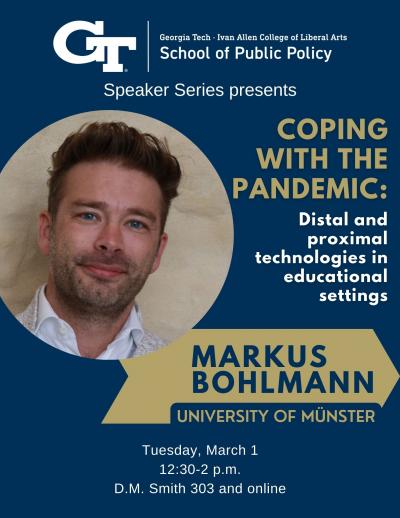
Date(s): March 1, 2022, 12:30 pm - 2:00 pm
Location: D.M. Smith Room 303 and Online
Join the School of Public Policy for the next installment in its speaker series. The event, "Coping with the Pandemic: Distal and Proximal Technologies in Educational Settings,” will feature Markus Bohlmann of the University of Münster in Germany.
Abstract
To address the tension between critical theory and postphenomenology in the philosophy of technology, Markus Bohlmann argues that each of these theoretical approaches can serve a specific purpose. Whereas the strength of critical theory can be seen in its ability to reflect on the role of technologies that are deeply embedded in more complex societal structures -- for example, a school's distance learning system that needs to satisfy a plethora of legal, administrative, societal, and political challenges -- postphenomenology's strength can be found in a more focused analysis of the intersection between human and machine as in Zoom meetings. Referring to the "distance" between human and machine in both these cases, Bohlmann proposes a distinction between "distal" and "proximal" technologies.
About the Speaker
Markus Bohlmann is a philosopher at the University of Münster in Germany. His research contributes to the didactics of philosophy, philosophy of science, and philosophy of technology. The focus of his research becomes visible in two forthcoming publications. His book Education - Philosophy - Digitalization will soon be published by Metzler in the series Digitality Research, and the essay "Technologies of the Crisis in Distance Learning" will appear in an anthology on technologies of the Covid pandemic. Within the German Society for Philosophy, Bohlmann leads the Education of the Digitality Working Group. His research in philosophy education is informed by his experience as a philosophy teacher in both middle and high school over five years. During this time, he contributed to the development of digital technologies that are now being used in the German education system, for example a cloud-computing project.
